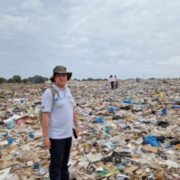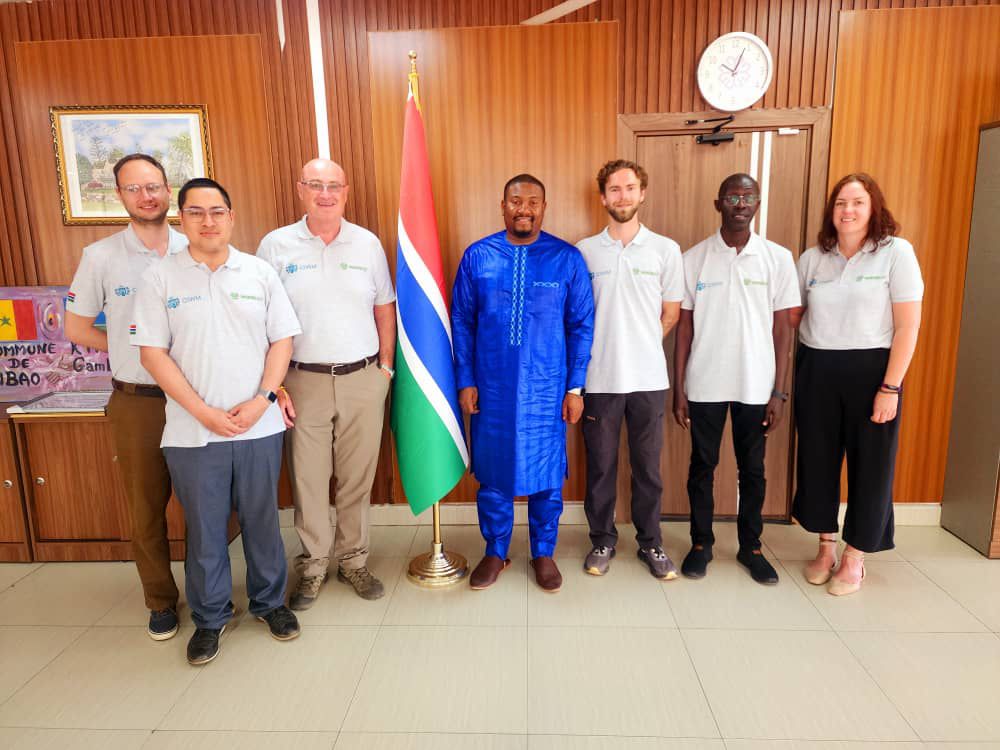The view from Gambia - helping a local authority abroad
Last month, Bonni Jee, APSE Principal Advisor at APSE, was part of a technical delegation of waste professionals from the UK organised and funded by the charity WasteAid and CIWM (Chartered Institute of Waste Management) to visit and provide advice to a local authority in the Gambia. He shares his reflections on the week-long visit there.
When I discovered that I was selected to join the technical delegation of four people to represent the UK and CIWM on the visit, I couldn’t believe it! I was also proud to represent APSE and our ethos of helping local authorities. I was joined by three other fantastic and experienced members from across the country.
One of the first things we did on arrival was to visit the existing ‘dumpsite’ operated by the Kanifing Municipal Council (KMC), where all the district’s waste goes. The district has a population of almost 400,000 and sits to the west of the capital Banjul, and is the country’s second largest. Mostly urbanised, it also has a beautiful coastline facing the Atlantic.
It is a waste facility like no other. It is not an engineered landfill, but a former quarry that has effectively been filled with waste over the years and is now building up over the surface. The scale is massive. The district has made strides over recent years to improve this situation through the purchase of compactor bin lorries, for example, but many of the densest areas of the district are too narrow for trucks to enter, so they do not have a kerbside waste collection. Private collectors and donkey carts carrying waste are still commonplace.
What was stark was that there are no formal separate waste collections for recyclables that we are used to. Still, there are pickers who will sort through the mixed waste to find valuable plastics, metals, cardboard etc for sale to merchants, but market conditions and rates of the materials, and unscrupulous brokers dictate the price of materials, with huge fluctuations and low prices, leading to a challenge in shifting material at decent prices. Work is ongoing to find more ethical local plastic recycling initiatives.
One of the interventions on site through an EU-funded project in conjunction with Peterborough City Council, is the building of a large shelter designed to be a sorting and holding area for recyclables, similar to a small transfer station and to improve conditions for workers.
Peterborough has done a lot of great work with KMC over the years providing knowledge and advice. But one thing I was not expecting to see here was Peterborough City Council’s logo proudly displayed on signs and flags across the district!
Another area of progress for the council is the diversion of organic waste to composting. The odour on the site in the 30 °C heat was not as strong as one might have expected, and that is thanks to the work with markets and vendors to divert food waste to make fertiliser. There is probably not a lot of food waste from households either. Hence, the main problem and bulk of the waste here is unsurprisingly plastic, and lots of it, along with tyres.
Following the dumpsite visit, myself and the CIWM delegation delivered workshops and activities over the following days to the key stakeholders from across the council. Many of the issues they face are similar to what we face here, which they were surprised to hear, from fly-tipping and illegal dumping to littering. They know the need for behaviour change and are striving to improve. So I shared examples of best practice and behaviour change communications from the UK, in true APSE fashion, giving a mix of approaches from hard enforcement and the use of social media to community-led approaches, from Wolverhampton to Bradford.
There was also a willingness to set out proper monitoring, evaluation and standard operating procedures for frontline staff. There are innovations they were proud to share, including route optimisation software and workforce monitoring. I shared how our LAMS app is used in the UK to track and monitor litter and fly-tipping here. There is a council-wide Zero-Waste Strategy in development, started with the work with Peterborough, and much of this isn’t dissimilar to a council waste strategy here; looking forward to separate recycling collections in future.
Our job here was to motivate the team and help refine this, and I shared how Newcastle City Council’s waste strategy is a good example of a well-set out and ambitious strategy.
Finally, it was over to local people to share with us the work they have been doing, through the local Circular Economy Network that WasteAid have set up. This was a truly inspiring event to see the ingenuity and entrepreneurial spirit of local people who are changing mindsets to see waste as a resource, not a problem that is out of sight and out of mind. Something we could learn from here.
.jpg)
Initiatives that were showcased included turning waste plastic into jewellery and other useful products, textile recycling, tyres into street furniture and selling fertiliser made from food waste to farmers, creating a true circular economy. Even simple things like collecting water bottles to give to fresh juice makers at markets to clean and refill rather than recycle.
All in all, this was a fruitful visit and unforgettable experience where the great team and I felt we made a difference and also learnt a lot from ourselves. Too many people over here take for granted the kerbside waste collection they have, and see waste as out of sight and out of mind and of no value, when millions do not have access to a kerbside waste collection at all, and many are salvaging valuable materials out of this. The warmth and friendliness of the local representatives was also something I will not forget. I am proud to have played a part in the journey of WasteAid and the CIWM, supporting the municipality and look forward to seeing their progress over the coming years.
Bonni will be presenting at the APSE Waste and Recycling Seminar on Thursday 23 October 2025 at the Nottingham Belfry Hotel. The seminar will explore the future of waste and recycling, and address the new waste legislation including simpler recycling, extended producer responsibility, mandatory food waste collections, and the wider implications of local government reorganisation.
You can find out more and book your place here.



.png)



.png)